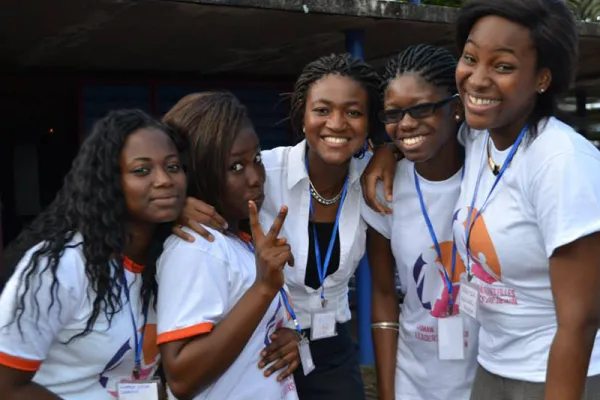Helping Girls Succeed: Smith Senior Wins Davis Prize for Project in Côte D’Ivoire
Campus Life

Published May 4, 2015
When Lou Laura Lydia Goore ’15 began thinking about ways to support young women in her native Côte D’Ivoire, she looked for gaps in services already being offered.
“I wanted to see what was missing,” explained Goore, who is majoring in economics at Smith. “That’s where the idea for a mentorship program came from.”
A two-day girls empowerment camp Goore helped organize last summer in Abidjan, the largest city in Côte D’Ivoire, was a resounding success. Surveys filled out by dozens of girls who participated in “Ahiman Women” said the program gave them new skills, knowledge and contacts, Goore said. Ahiman means “the future” in the Baoulé language.
This summer, Goore hopes to draw even more girls and adult mentors to a new and expanded leadership camp. Her proposal for Ahiman 2015 has been selected as one of 127 Projects for Peace funded by the Davis United World College Scholars Program.
Created nine years ago by the late philanthropist Kathryn W. Davis, Projects for Peace supports undergraduates who want to “launch initiatives that will bring new energy and ideas to improving the prospects for peace in the world,” said Philip O. Geier, executive director of the program.
Smith was one of 92 educational institutions whose students submitted proposals this year. The winning 127 projects will receive $10,000 implementation grants for projects in countries spanning the globe.
In her proposal, Goore described what she had gained from attending the African Leadership Academy in South Africa before entering Smith. She emphasized the need for similar mentorship and leadership programs for girls in Côte D’Ivoire.
Many Ivorian girls “do not have the chance to benefit from those resources since their parents are either illiterate, living in poverty, or are in remote regions with no exposure to the professional world,” Goore wrote.
“I believe that one of the ways to tackle these issues is using the power of mentorship and leadership training to help girls succeed,” she added.
Here’s what else Goore had to say about her Project for Peace.
How did Smith help prepare you for creating a successful peace project?
Goore: “I took part in the Center for Women and Financial Independence elevator pitch competition in my sophomore year. My teammate and I pitched our idea, “EZ Shower” for shower facilities at major transport hubs. We learned how to do a business plan, a mission statement, a budget—all of those things. When I was looking for sponsors for Ahiman, I had to get in a car and quickly talk to a donor. It was just like the elevator pitch, where we had only 90 seconds!”
You met one of your Ahiman co-founders at the African Leadership Academy. Can you talk about other ways that event was important to you?
Goore: “Yes, that’s where I first heard about Smith from a guidance counselor. I had never thought that I would leave home—I thought that people who went away to boarding school were crazy. The academy had a career counselor and mentors, and they gave us information about scholarships.”
How did you go about recruiting girls for Ahiman 2014?
Goore: “My teammates and I basically went house to house and talked to people. Some of the parents said, ‘You want to bring the girls where?!’ We found that boys who heard about the program were more interested, while the girls were more shy. That’s one reason we need a program like this.”
What did you like best about the program you led last summer?
Goore: “We had so many fun activities. One of them was where people shared their dream of what they wanted to be in the future. It was nice to see that everyone had a dream. Sometimes, as we grow up, that dream fades, so it was good to be reminded. One girl wanted to be an architect, and she had a small drawing book. There was a woman there from an architectural firm, and the girl went up to her and said, ‘I want you to look at my drawings.’ The woman told her to come and shadow her anytime.”
What impact will the Davis prize for peace have on your project?
Goore: “The peace project money will allow us to do a five-day camp instead of two. We learned a lot from last summer, and we want to do better with communications and getting in touch with more girls. We’re trying to reach more people in the remote areas because girls in the rural areas are the ones who need this most. The project money will help us with transportation and food. We also want to schedule a shadow day where the girls will follow a mentor at work. The goal is to have girls do three summers of the camp and then become Ahiman ambassadors so they can reach even more people.”
What are your plans after graduating this spring?
Goore: “I just learned that I got a job working with local businesses in Ghana for Stanford Institute for Innovation in Developing Economies (SEED). I want to do something like consulting that can help improve businesses. Eventually, I want to have my own business. I will stay involved with Ahiman, but I want to find a way I can give ownership to other people.”
Lou Laura Lydia Goore ’15 (third from left) with some of the young women she is helping to mentor in her home country of Cote D'Ivoire. Goore was awarded a Davis Peace Project prize for founding Ahiman, a nonprofit mentoring group for Ivorian girls.